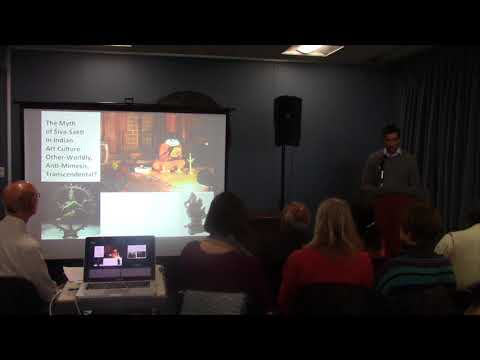The recent critical edition to Śaṅkara’s Śrī Lalitā Triśatī Bhāṣyam by Yajneshwar S. Shastri and Sunanda Y. Shastri represents an important and timely intervention. Through compelling demonstration that Śaṅkara is the veritable author of this text, they help to not only rejuvenate the worship of Śrīvidyā, but to refocus our attention on the powerfully feminine, heart-felt, and playful aspects of Indian religions and philosophies. This paper echoes the spirit of the Shastris’ wonderful introduction to and translation of Śaṅkara’s commentary. By examining classical Indian debates in philosophical aesthetics, it challenges still-prevailing views that Indian art is essentially spiritual, transcendental, and hence anti-realistic or anti-naturalistic (in contradistinction to Western art). This involves consideration of the prominence of anukṛti vāda (mimesis theory, or the doctrine of representation) in Indian art practice and commentarial literature. It then turns to the Abhinavabhārati of Abhinavagupta (Abhinava), the 11th century Kashmiri Śaiva who is often lauded as India’s most influential philosopher of art. Curiously, Abhinava rejectsmimesis theory in order to accommodate his view that the art experience entails a transcendence of all duality. But his aesthetic theory does not confirm exoticist views of Indian art as other-worldly or anti-realist. To the contrary, by formulating the art experience as a replication of the myth of Śiva (consciousness) in relation with his consort and power, Śakti (the other), Abhinava anticipates contemporary Western insights into themimetic workings of creative imagination. The artwork is not to simply mimic objects in reality with a view to enacting a free display of illusions. Rather, it appropriates objective representations in order to celebrate the essential drama of reality as an unending play of the “I” forgetting and re-cognizing its union with the goddess, Śakti.
Geoff Ashton, Ph. D. | University of San Francisco
Geoff Ashton recently joined the Department of Philosophy at the University of San Francisco from the University of Colorado at Colorado Springs, where he also held an appointment as Assistant Professor of Asian Philosophy. Geoff Ashton has studied Sanskrit, Thai, and Spanish, and conducted research at numerous institutions of higher learning abroad (twice as a Fulbright scholar), including Jawaharlal Nehru University (Delhi, India), Deccan College (Pune, India), the Jñāna-Pravaha Institute (Varanasi, India), Chiang Mai University (Chiang Mai, Thailand), Chulalongkorn University (Bangkok, Thailand), and La Universidad Autónoma de Madrid (Madrid, Spain). He has authored numerous articles, book chapters, and essays on Indian Philosophy, Buddhist Philosophy, Philosophy of Religion, Comparative Ethics, and Comparative Aesthetics. He has three main research agendas: Indian Philosophy of Religion, Buddhist Philosophy and Comparative Ethics, and Comparative Aesthetics. He is currently revising a manuscript titled, Whose Suffering? Whose Freedom? A Phenomenological Reconstruction of the Philosophy of the Sāṃkhya Kārikā (under review). Interpreting Classical Sāṃkhya philosophy through the lens of José Ortega y Gasset’s existential phenomenology, this book attempts to shed new light on the interrelation between the traditional Indian concepts of suffering, freedom, selfhood, and action.
LMU Yoga Studies
Source



